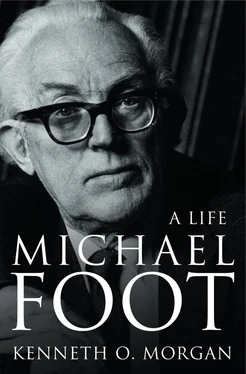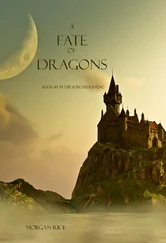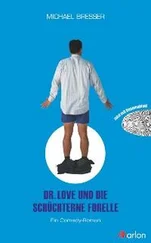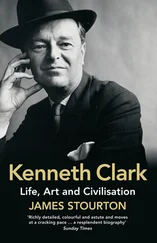Michael Foot’s mother, Eva Mackintosh, was also a powerful personality in her way, even if tending to be swamped at home and in spirit by Isaac’s intemperate bibliophilia. Born in 1878 and a year and a half older than Isaac, she was of Scottish and Cornish background, and a strong Methodist like her husband. Indeed, it was on a Wesleyan Guild Methodist outing that Isaac first set eyes on her. With a characteristic Foot blend of impulsiveness and caution, he proposed to her almost immediately and was accepted, but then remained engaged for three years while he built up his solicitor’s practice. They married in 1904, in Callington, a village a few miles north of Plymouth where Eva had latterly lived. It was a long and immensely happy marriage, ended only when Eva unexpectedly died in May 1946, after which Isaac somewhat disconcertingly for the family married a second time. Eva had traditional non-feminist views, which clearly extended to her two daughters, Jennifer and Sally, both of whom had somewhat restricted lives. Her son John’s egalitarian-minded American fiancée evidently found this disturbing when she first visited the Foot household.
Five of Eva’s seven children, including Michael, were given the second name Mackintosh (an allegedly useful asset when brother Dingle stood as Liberal candidate in Dundee). She wrote occasional letters to the local Western Morning News under the thinly-concealed nom de plume of ‘Mother of Seven’. Hugh Foot wrote in his memoirs of how his mother made them all laugh ‘at ourselves and at each other’. 13 Eva was not only happy being a warm and spirited mother, but also gave every encouragement to the professional careers of her talented sons. She was thoroughly at home in a political setting, being herself a robust Liberal, and perhaps more instinctively attracted to radicalism of the Lloyd George type than other members of the family. Michael’s defection to Labour in 1934 was a shock for them all, but Eva appears to have taken the news better than some. When Michael campaigned for Devonport as a Labour candidate in 1945, a meeting was interrupted by the delivery of a large Cornish pasty from his mother, a Methodist’s material peace offering and also a signal that her socialist son was no less favoured than husband Isaac and sons Dingle and John, all Liberal candidates in 1945 (and, unlike Michael, all defeated).
The family background of the Foots is of quite exceptional importance: the historian John Vincent once called their home, referring to the Hertfordshire seat of the Cecils, ‘a West Country Hatfield’. There were five sons: the eldest Dingle (1905–78), the second Hugh (1907–90), the third John (1909–99), the fourth son and fifth child, Michael (born in 1913), and the youngest son and sixth child, Christopher (1918–84). All went on to have, to varying degrees, fulfilling professional careers. By contrast the daughters, Margaret Elizabeth, known as Sally (1911–65), and Jennifer (1916–2002), had lives that were domestically confined. Jennifer married, but Sally never did. It was a large and lively household, with much family fun and frivolity and a high degree of competitiveness in the playing of games, especially cricket and football, in which Isaac enthusiastically joined. They lived in Lipson Terrace from 1904 until in 1927 they moved to a large white Victorian manor house, Pencrebar, near Callington, some eight miles north of Plymouth, overlooking the Cornish moorland. With its ‘wide sashed windows, large rooms and wide sweeping lawns and shrubberies’, it became a focal point for West Country nonconformist Liberalism and a much-loved family home, as well as a depository for Isaac’s vast library. 14
It was in every sense a close-knit family which made demands of all the children, but enriched them too. They all recalled a cheerful and secure childhood. Hugh noted that ‘we had and needed few outside friends’. The eldest boy, Dingle, with whom Michael had little to do at first because of the eight-year gap between them, immediately showed himself to be talented. He was thought to be the ablest Foot at the time, and Michael later considered him the funniest orator amongst them. 15 As all the Foot boys did, he went to a private secondary school, in his case Bembridge School on the Isle of Wight, where he was taught by a former Liberal MP, J. H. Whitehouse, who was now the school’s headmaster. Dingle went on to Balliol College, Oxford, where he became President of the Liberal Club in 1927 and rose to be President of the Union in 1928, also gaining a second-class honours degree in law. He entered chambers in 1930, becoming a barrister of international distinction, and in 1931 he was elected as Liberal (though pro-government) MP for Dundee, which he represented until 1945. One problem was the physical disability of a tubercular arm. The second son, Hugh, went to Leighton Park, the famous Quaker school near Reading which Michael later attended, and then on to St John’s College, Cambridge, where he showed a notably un-Foot-like enthusiasm for the college rowing club but also became President of the Liberal Club and of the Cambridge Union. There was some fraternal joshing about his alleged relative lack of intellectual sharpness – Michael described him caustically and unfairly in the Evening Standard in 1961 as ‘never considered the brightest of the brood’. But Hugh, like his brothers, ended up with a second-class degree. In fact Michael always had a strong relationship with ‘Mac’, as Hugh came to be known, including a cheerful period as the lodger of Hugh and his wife in the later 1930s. His assessment of his brother concluded: ‘All in all a credit to the family and I can’t say fairer than that, can I?’ With Hugh’s son Paul, the friendship was to be stronger still.
John, the third son and another charming and eloquent Liberal, seemed as talented as any of them. He too went to Bembridge School and Balliol College like Dingle, took a degree in law and also became President of the Liberal Club and the Union, a remarkable dynastic achievement which Michael was soon to extend. He became a solicitor and in due time took over from Isaac as senior partner in the family firm Foot & Bowden. But his political antennae seemed no less acute than those of his two brothers, and he was four times a Liberal candidate, for Basingstoke in 1934 and 1935, and for his father’s old stamping ground of Bodmin in 1945 and 1950. Unexpectedly he failed to win the latter, and ended up as Baron Foot of Buckland Monachorum, though with a radical outlook on social and defence issues very similar to those of his firebrand brother Michael. The two were both Cromwellian enthusiasts, and were very close. Michael would say of John, ‘He was the best speaker of the lot of us.’ 16 The two daughters, Jennifer and Sally, as mentioned, were not encouraged to develop their talents, while the youngest son, Christopher, settled down, none too happily, as a local solicitor.
This was the background into which Michael Mackintosh Foot was born on 23 July 1913. It was cradle, crucible and cauldron for him. The tone was set by Isaac. It was distinguished by a passion for both literature and music (the latter less pronounced in Michael’s case until he met Jill Craigie, who introduced him to Mozart), especially Bach’s choral music, and a passionate devotion to the grand old causes of nineteenth-century Liberalism. It was an intimate family whose members kept up warm relations throughout their lives. Michael and his brothers addressed each other in letters or telephone conversations with the words ‘pit and rock’. This private code recalled a famous phrase from the Book of Isaiah: ‘Look unto the rock whence ye are hewn and to the hole of the pit whence ye are digged.’ Hugh thus communicated with Michael while serving at a tense period as Governor of Cyprus in the late 1950s. Life in the Foot family seems to have been inspiring and somewhat pressurizing at the same time, being conducted at a high level of intensity, both political and religious. One newspaper described the household as characterized by ‘bacon for breakfast, Liberalism for lunch and Deuteronomy for dinner’. 17
Читать дальше












